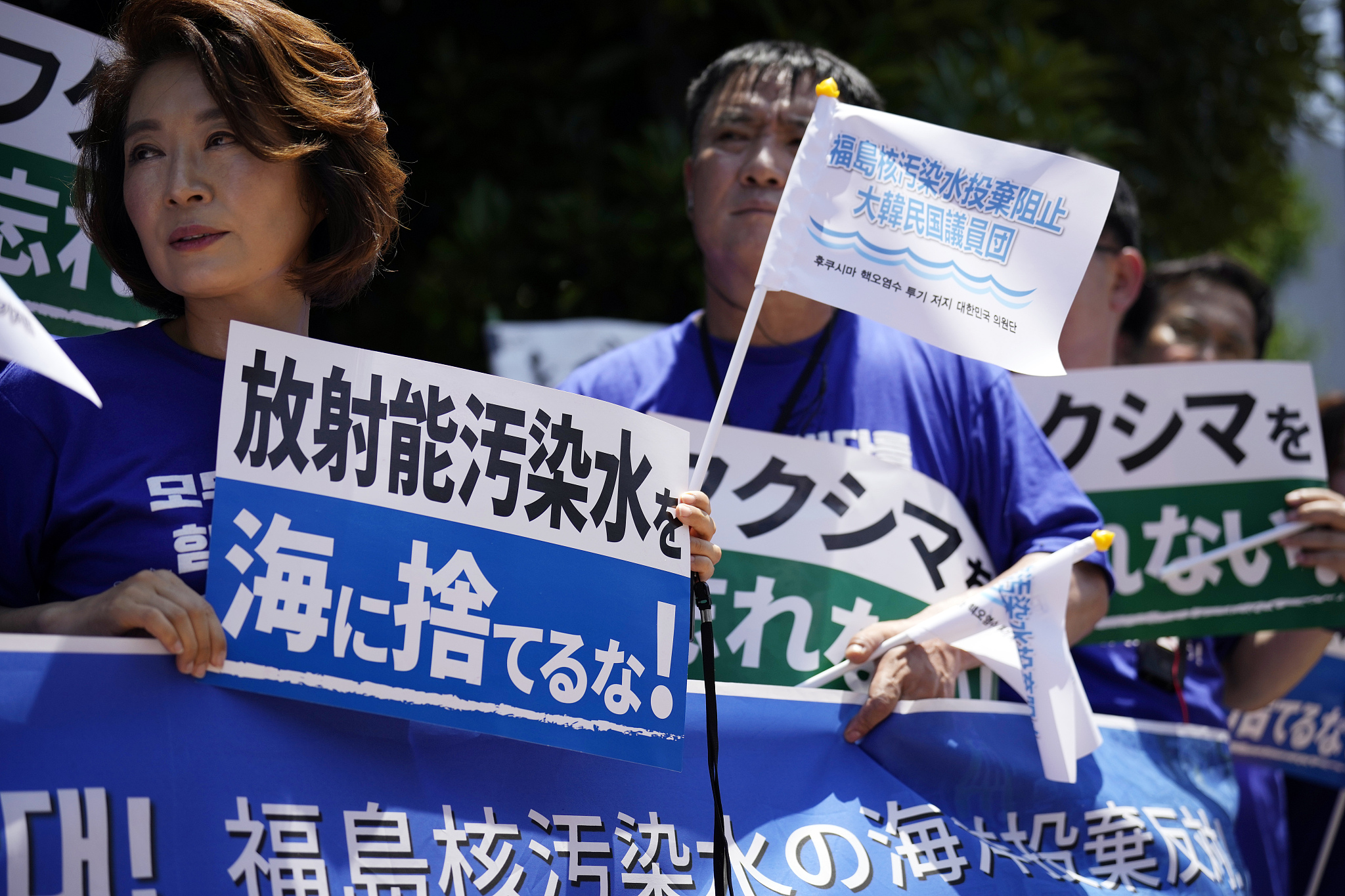
South Korean lawmakers hold banners against Japanese plans to release treated wastewater from the damaged Fukushima nuclear power plant, on July 10, 2023, Tokyo, Japan. (PHOTO: VCG)
By?TANG?Zhexiao
Japanese officials are expected to consider releasing nuclear-contaminated wastewater from the tsunami-wrecked Fukushima nuclear power plant into the ocean between late August and early September, Kyodo News reported.
An International Atomic Energy Agency (IAEA) safety review has concluded in July, noting that Japan's plans to release treated water stored at the Fukushima nuclear power station into the sea are consistent with international safety standards.
According to Tokyo Electric Power Company (TEPCO), the majority of some dangerous substances contained in the nuclear-contaminated wastewater can be removed from the water.
Japan and the IAEA say it's safe, but nearby countries fear the wasted water may contaminate food, The Guardian reported.
The real issue of concern for the global community is a hydrogen isotope called radioactive tritium, which cannot be removed from the water. There is currently no technology available to do so, said Cable News Network (CNN).
The U.S. Nuclear Regulatory Commission acknowledged that any exposure to radiation could pose some health risk.
According to The Guardian, attempts by Japanese government officials to win regional support for the plan have had limited success. The planned discharge has sparked anxiety and anger at home and abroad.
Given the deadline for the planned discharge, Fukushima's fishing industry fears that—whether the release is safe or not—the move will cause import bans on Japanese seafood, undermine consumer confidence in their catches, and once again threaten their recovered life.
Data from Japan's Ministry of Agriculture, Forestry and Fisheries shows Fukushima's coastal fishing industry landed catches worth around 69 million USD a year before the disaster. Once dwindled to little more than 17 million USD, the figure recovered to around 26 million USD by 2022.
"Even after treatment, some radiation stays in the water," Harumichi Saito, an activist from Iwaki, a city south of the wrecked plant, told AP News, noting that, "It's a decades-long, multi-generational project that must get public consensus."
Tatsujiro Suzuki, a nuclear engineering professor from Nagasaki University's Research Center for Nuclear Weapons Abolition, told the BBC that he remains concerned about a potential accidental release of contaminated water, given that TEPCO failed to prevent the 2011 disaster.
In South Korea, Japan's neighbor, a recent poll shows 80 percent of respondents are worried about the water release.
A day after the government formally endorsed the safety of the Japanese plans, hundreds of South Koreans marched toward the Japanese Embassy in Seoul, to oppose the sea disposal of Fukushima's treated wastewater.
In a Q&A published on the World Health Organization website, it is said: "Over time, radionuclides may be transferred through soil into crops or animals and build up within food. Radionuclides can also be washed into rivers, lakes and the sea where fish and seafood could take them up."
Tim Mousseau, a biological professor at the University of South Carolina, told CNN that even if this is common practice among nuclear plants, there just isn't enough research into the impact of tritium on the environment and on our food items.
Meanwhile, Professor Rudolf Wu from the Education University of Hong Kong echoed this view, warning it would be difficult to track its mutations. The tritium will change into organic tritium when it enters in the marine environment, which can accumulate along the food chain. It's irreversible and high-risk, he said.
Japan's headstrong push to discharge nuclear-contaminated water into the sea leaves the entire world at risk of nuclear contamination.
Japan needs to find a truly responsible, safe and effective way to deal with the Fukushima contaminated water and subject itself to rigorous international oversight so as to avert irrevocable damage to the global marine environment and human health, according to a remark made by China's Foreign Ministry on August 9.
The trio will conduct a series of experiments in fields such as life science, fluid physics, combustion science and materials science. Notably, this is the first time that fruit flies have been taken on a Chinese space mission as experimental subjects. What made scientists choose fruit flies? What experiment will they undergo?
